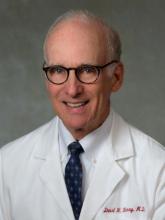Susan Dent, MD, codirector of the cardio-oncology program at Duke University in Durham, N.C., reflects on virtual grand rounds, telehealth, the screening of patients before clinic visits, and other new realities of cancer care in the age of COVID-19. Dr. Dent also discusses the importance of assessing breast cancer patients for cardiotoxicity.
In Clinical Correlation, Ilana Yurkiewicz, MD, of Stanford (Calif.) University, talks about the importance of advance directives.
* * *
Cardiotoxicity in breast cancer treatment
HER2 drugs (such as trastuzumab) and conjugates
- If given appropriately, these drugs have limited cardiotoxicity.
- The mechanism of cardiotoxicity is a “stunning of the heart.”
- If there is a significant drop in left ventricular ejection fraction (LVEF), you may need to hold the drug but this should be restarted if LVEF improves.
- When problems arise, they tend to occur early on.
- Important to assess baseline risk factors. Older individuals with underlying hypertension, diabetes, and other conditions need monitoring.
Anthracyclines
- The appropriate/safe dose of anthracyclines may be different for each person, based on risk factors such as age and underlying conditions.
- Assess patients at baseline using cardiac imaging and biomarkers, and risk factors. If no symptoms of cardiotoxicity, reassess 6-12 months after treatment.
- If a patient has poorly controlled hypertension or diabetes, those factors should be better managed to minimize the risk from anthracyclines.
Liposomal anthracyclines
- These formulations are less cardiotoxic, but they have not been widely adopted in breast cancer.
Immuno-oncology antibodies
- Myocarditis is one of many side effects seen with immunotherapy. It’s not a common side effect (about 1% or less), but when it does occur, it has a 50% fatality rate. Have a high level of suspicion for myocarditis if a patient on immunotherapy presents with shortness of breath and chest pain.
* * *
For more MDedge Podcasts, go to mdedge.com/podcasts
Email the show: podcasts@mdedge.com
Interact with us on Twitter: @MDedgehemonc
David Henry on Twitter: @davidhenrymd
Ilana Yurkiewicz on Twitter: @ilanayurkiewicz

